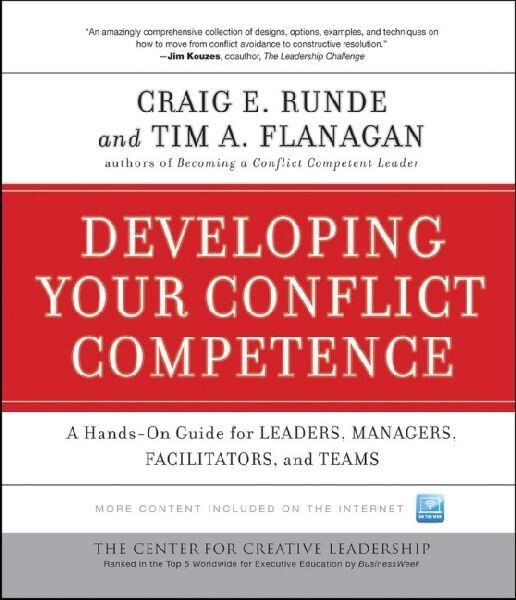Craig E. Runde and Tim A. Flanagan, Developing Your Conflict Competence: A Hands-On Guide for Leaders, Managers, Facilitators, and Teams. Jossey-Bass, 2010.
Referenced in: Church Conflict – Leadership, Preaching, and Worship in Church Conflict
LifeandLeadership.com Summary
This is a high-quality set of resources produced by the Conflict Competent organization, in association with the Center for Creative Leadership, and the Center for Conflict Dynamics at Eckerd College. It is based on extensive research and practice. As a business resource, it is not addressed to church leaders, but the concepts translate easily into congregational settings. It is perhaps the best model available for an overall program for increasing conflict competence as an organizational leader. The author draws heavily on Ron Heifetz’ theory of adaptive leadership.
The foundational volume is Becoming a Conflict Competent Leader (2006). It is by definition a “leadership book that deals with conflict,” not a “text on conflict management” (xii), thus it approaches conflict as leaders encounter it. The main focus is convincing leaders of the importance of developing conflict competence, first through self-awareness and self-control, and second by avoiding destructive responses to conflict and adopting constructive responses. A secondary focus is to encourage leaders to engender conflict competence in their organizations. It is an excellent first-line defense of the importance of healthy conflict management and an explanation of the necessary skills and attitudes. The authors provide an extensive overview of resources and trainings one can purse for further development.
The second book in the series, Developing Conflict Competent Teams (2008), addresses the arena in which leaders most often experience conflict, work teams. It delivers the kind of comprehensive and well-researched guide readers of the first volume would expect. The authors discuss when and how conflict arises in teams, and why it occurs so regularly. They also equip teams to rise to the challenge of conflict, minimizing its negative effects and capitalizing on the positive opportunities it presents. They describe how to create an effective climate of trust and emotional control that allows members to talk openly and honestly during conflicts rather than let issues fester. Next they explore specific constructive communication techniques that if used consistently, deepen trust and enable teammates to discuss issues in ways that lead to mutually satisfying resolutions and creative advancements. This includes a section on how to get back on track once conflict has gotten out of hand. There is also a helpful chapter on managing conflict in virtual or technologically-mediated communications teams and teams made up of diverse cultures. The final chapter offers a series of assessments to help teams realize their current level of conflict competence and begin the path of improvement.
The third book in the series, Developing Your Conflict Competence (2010), the one referenced in the picture to the right, is a set of practical, hands-on tools for self-help or group training. As the publisher describes:
Throughout the book, authors Craig Runde and Tim Flanagan outline a concrete process for dealing with unavoidable workplace tensions and present a series of thought-provoking questions and self-diagnostics. Developing Your Conflict Competence is a comprehensive guide to managing disagreements, differences, and discord. It shows how an individual can practically help others deal with conflicts that are causing friction within an organization. Runde and Flanagan also give down-to-earth advice for dealing with discord within teams. They show how teams can establish norms for handling conflict by creating the right climate for discussing issues and using effective communications techniques. On a more global level, the authors present specific approaches for changing organizational culture so conflict can be addressed with effectiveness and immediacy.
About the Authors
Craig E. Runde is director of new program development at the Leadership Development Institute at Eckerd College, St. Petersburg, Florida.
Tim A. Flanagan is director of custom programs at the Leadership Development Institute at Eckerd College, St. Petersburg, Florida.
The Center for Creative Leadership is a nonprofit educational institution with international reach whose mission is to advance the understanding, practice, and development of leadership for the benefit of society worldwide. With campuses in Greensboro, North Carolina; Colorado Springs, Colorado; San Diego, California; Brussels; and Singapore, it conducts research, produces publications and assessment tools, and offers a variety of educational programs. The Financial Times has ranked CCL among the world’s Top 5 providers of executive education.
***For additional information on this resource, including reviews, click the bookstore links. Check the reference at page top or the links below for resource guides on related topics.***
Related Areas
See Other Resources on Church Conflict:
See Resources on Over 100 Areas of Ministry Leadership:


